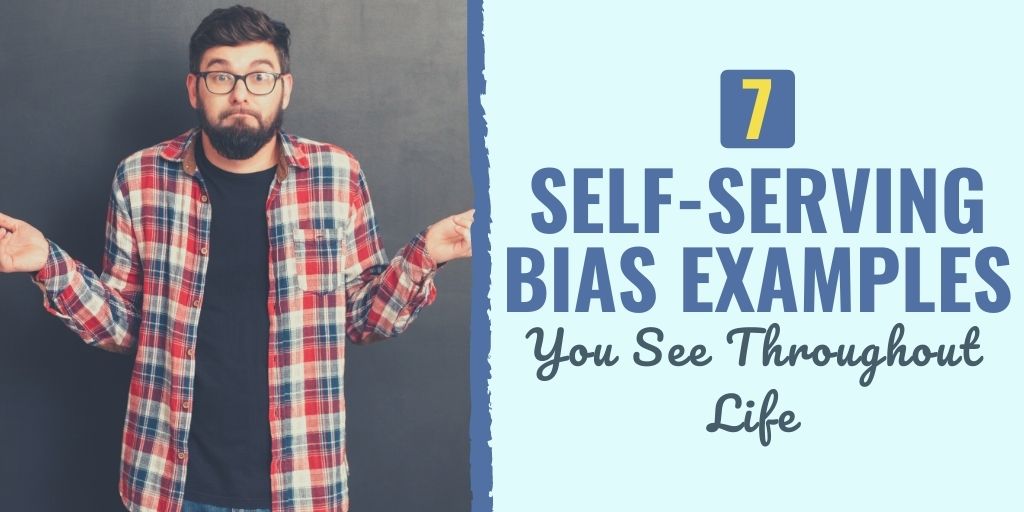There might be affiliate links on this page, which means we get a small commission of anything you buy. As an Amazon Associate we earn from qualifying purchases. Please do your own research before making any online purchase.
When something good happens, people tend to think: “I worked so hard, I’m so talented, I did a great job!”
But when things go wrong, people often start taking a mental account of any external factors that could be to blame.
Can you think of a time when you were quick to take credit for a victory, but looked to other possible causes when things went wrong? I can think of a few.
We have talked a lot about blaming others for things that go wrong, and today we are going to look at a cognitive bias that offers some explanation for why we tend to do this.
The self-serving bias is very common, and it’s important to know about so you can do an honest, comprehensive assessment when you don’t achieve the outcomes you had hoped.
Let’s first look at an in-depth definition of the self-serving bias and why it’s important to recognize, then we will go into some examples of when you may come across this in your everyday life.
What Is the Self-Serving Bias?
Put simply, self-serving bias is a pattern of thinking in which people attribute positive outcomes to internal factors (e.g. talent and hard work) and negative outcomes to external factors (e.g. bad luck or the difficulty of the task).
The self-serving bias stems from a larger concept in social psychology, known as causal attributions, which refers to how we interpret and explain the reasons behind everyday events. Social Psychologist, Fritz Heider, postulated the attribution theory, which explains that people either attribute their outcomes to ability and effort (internal) or difficulty and luck (external).
It’s important to note that the self-serving bias is only relevant when people conclude attributions for their own behavior–not when they’re judging others. Here is why this is considered to be a bias: When one’s personal outcomes are positive, people tend to make internal attributions, but when the outcome is negative, people make external attributions. So the attributions are biased depending on the outcome.
Interestingly, studies show that the self-serving bias is much more common in our competitive Western culture where our feelings of self-worth are often closely tied with our successes or failures, while it’s less common in Eastern cultures, where people tend to attribute success to luck or chance.
People connect outcomes in a way that will serve their self-interest. There are three reasons that people do this (aside from cultural and demographic factors):
Why Is this Cognitive Bias Significant?
While this common bias may seem harmless, it’s important to be aware of it and its potential impact on your life. Recognizing this bias can help you recognize important mistakes that lead to unfavorable outcomes. After all, if you don’t acknowledge your mistakes, you won’t be able to learn from them or repair them in the future. As we know, a big part of being successful is learning from your failures and then making the appropriate improvements. But you’re never going to improve if you don’t know what you need to work on.
Self-serving bias certainly allows us to protect our self-esteem, but after continuously missing out on the opportunity to address our own short-comings, we become accustomed to looking toward external factors to assign fault.
You will notice–especially in the first example below–how this faulty reasoning isn’t coupled with malice intent. People genuinely avert their minds from looking internally for possible mistakes and assume their failure is a result of something else. So when you’re aware of the self-serving bias, you’re less likely to accidently maintain this narrow mindset.
Let’s take a look.
7 Self-Serving Bias Examples You See Throughout Life
1. Win/Lose
An individual’s performance in sports is so distinctly connected to a certain outcome that it’s common for players to demonstrate a self-serving bias. This is especially true in individual sports, where the sole winner of a game is clearly defined.
When an athlete wins a game, they’re likely to applaud themselves for their talent, practice, and commitment to their chosen sport. But if they lose their next game, they may start to question the referees’ calls.
For example, let’s say you’re playing baseball and you’ve just hit your third strike. If you genuinely think the umpire called your strikes unfairly when he should have been recognizing the poor pitches you were receiving, the self-serving bias has kicked in to help you maintain your self-esteem regarding your hitting skills.
A 2020 comprehensive meta-analysis of 69 studies that reviewed a total of 10,515 athletes found that sports players exhibit a self-serving bias through their tendency to attribute success to personal factors and failure to external factors.
2. Bad Test Scores
The self-serving bias can help students maintain their sense of pride surrounding their hard work after receiving a good grade on a test, as they can attribute their success to their study habits and expertise on the subject.
However, that same acceptance of accountability may not be the case if the exam score is lower than expected. After receiving a low grade, a student may recall the test as being unfair or poorly written. Or maybe the student even perceives the questions as being unrelated to the material that was taught.
This doesn’t mean that the student is being dishonest–she could have, in fact, been dedicated to studying and learning the material. But the student could be engaging in faulty logic when the thought of her inadequate studying doesn’t come to mind.
3. Teachers
As it turns out, studies have shown that, like students, teachers can also hold self-serving biases when it comes to outcomes in their classroom. This creates the potential for conflict between students and teachers when someone gets a bad grade because neither may accept responsibility for the poor outcome.
While a failing student may want to place blame on the teacher, the teacher is likely to hold the student accountable for their work, especially if other students are receiving passing grades. And in turn, if students do very well, a teacher may praise herself for her excellent teaching skills.
4. Job Hunting
How do you feel when you’re offered a job after going through an (often exhausting) interview process? You may believe your experience, qualifications, achievements, and hard-earned interview skills have really paid off.
But when you receive that dreaded “We regret to inform you…“ letter from the hiring manager, it may cross your mind that the interviewer didn’t “like” you, or didn’t ask the right questions to really highlight your skills.
Research shows that employment is often explained by the self-serving bias, in that being hired for a job is often attributed to internal factors, while being rejected for a position (or being terminated) is attributed to external factors–whether that’s a short-sighted hiring manager or something else–it’s never the employee’s “fault”.
5. At Work
You can probably think of a situation in your past working experience in which you witnessed a coworker with a self-serving bias, even if you didn’t know there was a name for it.
The self-serving bias frequently comes up in professional environments because employees want to present themselves in a positive way to their superiors and colleagues. Employees want to maintain a positive reputation of being competent, knowledgeable, qualified, and accurate with their work.

You may have experience working with a colleague who is always eager to take credit for any positive outcomes or pursuing praise from others while denying blame of any sort when there’s an issue. This can be attributed to the self-serving bias, which can lead to a toxic work environment when the at-fault employees lack the self-awareness to recognize their role in the problem.
However, many studies have found that the more distant a relationship is between employees and their coworkers, the more blame people place on others for failure in the workplace. This means that people who work closely on a consistent team are less likely to blame others for poor outcomes than, say, colleagues working virtually on a one-time project.
6. Workman’s Comp
This cognitive bias is actually so common in workplaces that researchers have studied how and when the self-serving bias has negative impacts that negatively impact productivity.
One example that researchers have found is in the case of workman's comp situations involving an accident of some kind. In these cases, the injured employee is likely to blame the incident on external factors, while onlookers commonly perceive the accident as being the employee’s fault.
This suggests that the self-serving bias can present itself in people who don’t commonly rely on this method of reasoning to preserve their egos–it can materialize itself in isolated instances in rational people who are typically level-headed.
So how can this impact productivity? If teammates have clouded judgement and are unable to properly respond to (or accurately analyze) unforeseen issues that arise, their rational decision-making skills may also be compromised when facing significant business junctures, which can impede progress of any kind.
7. Car Accident
During my junior year of college, I was driving about 40 mph when another student pulled out onto the road, hitting the back passenger side of my car. As we got out of our cars, she apologized for the seemingly straightforward mistake on her part. It wasn’t a particularly bad accident, but it did enough damage to both cars that we called the police.
Fast forward 10 minutes when she and I were talking to the policeman, and she had been given just enough time to change her mind. She decided the accident was my fault, claiming I stopped in the middle of the road when I saw she was about to pull out, backed my car up, and positioned it so when she did pull out, I would be in her way once she accelerated.
I believe a lot of people involved in car accidents don’t want to admit fault– and it turns out that 75% of people involved in accidents actually believe they’re not at fault and blame the other driver from the beginning.
This is due to the self-serving bias because people naturally want to protect their self-image and prevent themselves from looking negligent.
Unfortunately in my situation, the other driver’s new story didn’t add up, and when the insurance adjuster came to look at the damage, he said her story was physically impossible after doing his assessment. So, her attempt at self-preservation backfired–at least she could have maintained her integrity if she stuck with her original claim that she was at fault.
And, in today’s world, research has been done on the relationship between the self-serving bias on the introduction of self-driving cars. While there are hopeful expectations of reducing the number of car accidents with autonomous cars, introducing these vehicles on a limited basis can’t eliminate accidents caused by human-driven cars. So while the owner of an autonomous car may have a reduced risk of being at fault for an accident, they’re still exposed to the threat of accidents caused by human drivers.
This study looked at the concept of self-serving bias in the context of drivers’ inclinations to own a self-driving car. A survey of 531 drivers showed that as self-serving bias increases, the perceived risk reduction of owning a self-driving car decreases (because the driver never thinks they would be at fault for an accident anyway), which also decreases one’s desire to own one of these new cars.
How to Avoid the Self-Serving Bias
While self-serving bias is common, you can avoid it and reduce its impact on your everyday decisions. Start by using mindful awareness to help you recognize situations in which you’re susceptible to this bias, such as those laid out in this article. When you learn about common cognitive biases, you can start to notice them, which will give you the opportunity to self-correct.
Through your mindfulness practice, you will also be able to identify potentially uncomfortable thoughts of being at fault without judging them.
You can also mitigate this bias by practicing self-compassion, which can help you reduce your defensiveness and accept constructive criticism when you’re on a journey to self-improvement. Self-compassion will also allow you to demonstrate self-kindness, especially in the face of failure.
Researchers have found that being open to increasing one’s self-compassion is especially helpful for athletes. In sports, athletes who have self-compassion have fewer negative thoughts and feelings, which helps athletes negate self-criticism and negative thoughts after making a wrong move. Furthermore, self-compassion allows athletes to benefit from constructive criticism because they maintain realistic self-evaluations and are able to recognize their weaknesses.
Final Thoughts on Self-Serving Bias
Self-serving bias is normal and it serves the purpose of protecting one’s self-esteem. However, if this bias goes unrecognized, it can be detrimental to self-growth and relationships.
Consider the examples of this bias laid out in this article and be mindful of times when you may be at risk for thinking in this manner.
Learn More About Logical Fallacies
- 15 Cognitive Biases: A List of Common Biases Many People Have
- Mere Exposure Effect: Definition & 5 Examples
- 5 Appeal to Nature Fallacy Examples in Media and Life
- 6 Outcome Bias Examples That Can Negatively Impact Your Decisions
- 7 Omission Bias Examples That Negatively Impact Your Life
- 6 Authority Bias Examples That Might Impact Your Decisions
- 5 Burden of Proof Fallacy Examples
- 5 Appeal to Tradition Fallacy Examples in Life
- 5 Appeal to Authority Logical Fallacy Examples
- 7 False Cause Fallacy Examples
- 7 Appeal to Ignorance Fallacy Examples
- 7 Appeal to Common Sense Logical Fallacy Examples
- 5 Post Hoc Fallacy Examples (and How to Respond to This Argument)
- Gambler’s Fallacy: 5 Examples and How to Avoid It
- 5 Appeal to Anger Fallacy Examples Throughout Life
- 7 Halo Effect Bias Examples in Your Daily Life
- 7 Poisoning the Well Examples Throughout Your Life
- 7 Survivorship Bias Examples You See in the Real World
- 7 Dunning Kruger Effect Examples in Your Life
- 7 Either Or (“False Dilemma”) Fallacy Examples in Real Life
- 5 Cui Bono Fallacy Examples to Find Out “Who Will Benefit”
- 6 Anchoring Bias Examples That Impact Your Decisions
- 7 Virtue Signaling Examples in Everyday Life
- 7 Cherry Picking Fallacy Examples for When People Ignore Evidence
- 9 Circular Reasoning Examples (or “Begging the Question”) in Everyday Life
- 9 Appeal to Emotion Logical Fallacy Examples
- 9 Appeal to Pity Fallacy (“Ad Misericordiam”) Examples in Everyday Life
- 9 Loaded Question Fallacy Examples in Life and Media
- 9 Confirmation Bias Fallacy Examples In Everyday Life
- 9 Bandwagon Fallacy Examples to Prevent Poor Decisions
- 5 Red Herring Fallacy Examples to Fight Irrelevant Information
- 9 Middle Ground Fallacy Examples to Spot During an Argument
- 5 False Equivalence Examples to Know Before Your Next Argument
- 7 Hasty Generalization Fallacy Examples & How to Respond to Them
- 6 Straw Man Fallacy Examples & How You Can Respond
- 6 False Dichotomy Examples & How to Counter Them
- 7 Slippery Slope Fallacy Examples (And How to Counter Them)
- What is the Planning Fallacy?
- How to Overcome the “Sunk Cost Fallacy” Mindset
Finally, if you want a simple process to counter the logical fallacies and cognitive biases you encounter in life, then follow this 7-step process to develop the critical thinking skills habit.

Connie Mathers is a professional editor and freelance writer. She holds a Bachelor's Degree in Marketing and a Master’s Degree in Social Work. When she is not writing, Connie is either spending time with her daughter and two dogs, running, or working at her full-time job as a social worker in Richmond, VA.


